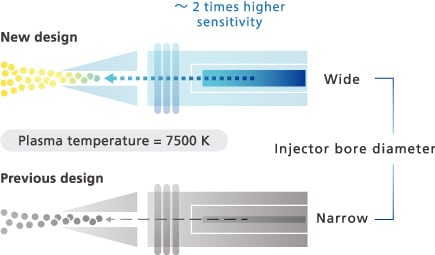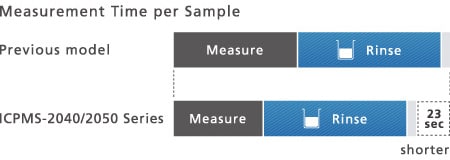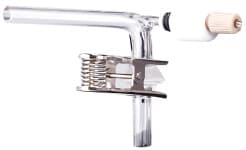ICPMS-2040 Series / ICPMS-2050 Series - Features
Inductively Coupled Plasma Mass Spectrometry
Exceptional yet Eco Friendly
An advanced mini-torch design, combined with a redesigned collision/reaction cell, and a high-performance quadrupole mass filter result in an environmentally friendly system with superior analytical performance.

Proprietary Advanced Mini-Torch System
-
Redeveloped High Sensitivity Mini-Torch
Optimizing the torch design keeps argon gas consumption low and decreases sample flow rate into the plasma, improving sample ionization efficiency. The new design roughly doubles sensitivity compared to previous models while reducing injector clogging issues.
-

Low Argon Gas Consumption
A major drawback of ICP-MS systems is the large argon gas consumption. Shimadzu’s mini-torch system consumes 11 L/min of argon, two-thirds the amount used by typical plasma torches. Continuous operation using a 7 m3 gas cylinder is up to 10 hours. Utilizing Eco mode (5.5 L/min plasma) during standby can further reduce argon gas consumption.
No Need for High-Purity Argon Gas
ICPMS-2040/2050 Series systems have a Shimadzu-made high-frequency power supply that features high-speed matching functionality, allowing for the use of low-cost, low-purity (99.95 %) argon gas to reliably generate a robust plasma.
Redesigned Collision/Reaction Cell
Collision Mode
Inert helium gas is introduced into the cell to selectively attenuate kinetic energies of polyatomic ions based on their sizes. These low energy ions are removed from the ion beam by applying a bias voltage at the cell exit. Because fewer by-product ions are generated, it can be used for a wide range of applications.

When analyzing 78Se, ArAr polyatomic ions interfere with it. Since Se and ArAr have different ion sizes, a kinetic energy difference occurs in the cell where He gas is introduced. As a result, Se can be measured with high sensitivity by setting an energy filter where only Se is exceeded*.
*Note: Example of how collision mode can be used.
Online Interelement Correction (IEC)
Shimadzu’s proprietary online interelement correction (IEC) function is used to correct for spectral interference that cannot be eliminated by the collision mode. By only measuring one standard sample an interference correction is calculated and applied to all samples run subsequently.
Reaction Mode 
When a specific gas is introduced into the cell, the reaction of gas with ions will occur to reduce interferences. Target ions can be analyzed with high sensitivity, while both doubly charged ions not eliminated by the collision mode and polyatomic ions can be reduced.

When analyzing 78Se, ArAr Polyatomic ions and Gd doubly charged ions interfere. However, charge and proton transfer occur by contacting interfering ions and H2 gas in the cell in which H2 gas is introduced. As a result, the target element, m/z=78, can be detected with high sensitivity. This shows how the reaction mode can mitigate the effects of doubly charged ions that cannot be removed by the collision mode*.
*Note: Example of how reaction mode can be used.
High-Performance Quadrupole Mass Filter
Charge Stabilizer
To mitigate ion charge effects on the mass filter, a pulse voltage is applied between the analysis of each mass to maintain a constant charge level at the electrode surface. This improves the signal stability when analyzing samples for long periods (patent pending).
High-Resolution Mode and Half-Mass Correction
Masses can be analyzed at 0.5 u intervals using the high-resolution mode, enabling half-mass correction for doubly charged interferences common in rare earth elements (REEs).
High Throughput with No Additional Cost
The improved gas controller features high-speed cell gas purging. Combined with ProActive Rinsing, measurement times can be significantly shortened without any additional accessories or cost.

-
High-Speed Cell Gas Purging
The redesigned gas controller shortens cell gas introduction and exhaust times (patent pending).
-

ProActive Rinsing
While measuring multiple samples, the rinsing sequence can be started early by sending the autosampler probe to rinse while collecting data using sample already in the suction line. This greatly reduces measurement time and conserves sample.
Minimal Operation Required
Using the extended rinse function with an optional dual valve unit allows the ICPMS-2040 Series and ICPMS-2050 Series systems to run autonomously after plasma ignition. With preset methods, the ICPMS-2040 Series/ ICPMS-2050 Series systems can be used immediately after installation with minimal training.
Extended Rinsing
—Automatically Minimizes Carryover— 
Analyzing samples containing a high concentration of target elements can cause carryover to the next sample, preventing accurate measurements. The extended rinsing function automatically performs an additional rinse sequence when a target element exceeds a predetermined upper limit. A second rinse solution can be used in the additional rinsing sequence to improve rinsing effectiveness. Consequently, carryover is eliminated to ensure high-quality data.
Dual Valve Unit
—Enables Autonomous Operation after Plasma Ignition— 

When using an Online Internal Standard Kit (optional), the operator must move the probe before and after data acquisition. The optional Dual Valve Unit allows seamless switching between tuning solution and rinsing solution
while also automatically adding internal standard solution to samples. The entire sequence, from instrument tuning, to measurement, to rinsing, and plasma off, are performed
automatically.-

Preset Methods
Preset analytical methods come configured with optimized settings, such as plasma conditions, target elements, mass information, and internal standards, for common ICPMS applications. The ICPMS-2040/2050 Series systems can therefore be used immediately after installation with minimal training.
| Environmental testing |
A method for analyzing drinking/tap water and a method for analyzing high matrix samples, such as waste water, are included. |
|---|---|
| Foods | A method for analyzing food samples with low TDS and a method for food samples with high TDS are included. |
| Pharmaceuticals | Methods are included, respectively for ICH Q3D analysis of oral, parenteral, inhalation and cutaneous drugs. |
Aerosol Dilution System

Aerosol Dilution System
By introducing argon gas between the chamber and the torch, samples with high TDS (total dissolved solids), such as seawater, are diluted and introduced directly into the plasma.
LabSolutions™ ICPMS Ver. 2
The new version of LabSolutions ICPMS software displays all necessary information in a single window, simplifying operation for new users. Experienced users can utilize advanced configurable settings for challenging applications, in-depth research and all analyses in between.
Downloads
Download the latest brochure.







